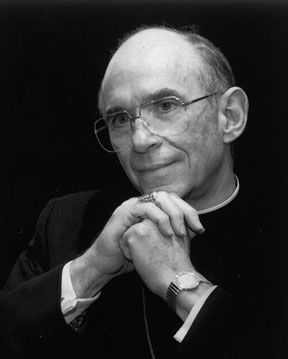
 COLUMBIA—Cardinal Joseph Bernardin became one of the most prominent Catholic leaders in recent memory.
COLUMBIA—Cardinal Joseph Bernardin became one of the most prominent Catholic leaders in recent memory.
Since his death in 1996, his ideas and legacy continue to be cause for debate and reflection, and their relevance in today’s world was the focus of two events held in his hometown of Columbia recently.
On Nov. 2, Washington Post columnist E.J. Dionne was the keynote speaker at the annual Joseph Cardinal Bernardin Lecture at the University of South Carolina.
Dionne, a Catholic who knew the cardinal personally, focused on the theme, “Reweaving the Seamless Garment: Cardinal Bernardin’s Living Legacy to American Public Life.”
The title refers to the cardinal’s idea of a consistent pro-life ethic for the church, a theory that included respect for life from birth to death and involved a variety of social justice issues, including abortion.
The seamless-garment has come under attack in recent years, with some Catholic theologians and commentators claiming it waters down the importance of abortion as a pro-life issue and requires too much compromise of Catholic teaching.
One of the most high profile debates over Bernardin’s legacy involved a recent article by author George Weigel, who claimed that the era of Bernardin’s influence is waning, and Peter Steinfels, who maintains that Bernardin’s message is even more relevant in today’s increasingly contentious political climate.
Dionne believes Cardinal Bernardin offers a good model for political debate in an era when partisan politics often trumps efforts to pass effective legislation that helps the most vulnerable in society.
He said Cardinal Bernardin’s seamless-garment idea asked that people reach beyond single-issue politics to consider that true concern for human life and dignity requires a focus on a wide variety of birth-to-death issues, ranging from abortion to poverty, health care, care of the elderly and terminally ill.
In essence, Cardinal Bernardin was saying that a true pro-life ethic begins with concern for the unborn child but must also include issues that affect that child’s life after it is born.
“He was willing to be controversial, willing to stir up arguments, willing to challenge everyone on every side to take their own words seriously,” Dionne said.
“What the cardinal preached is what you might call prophetic balance,” he continued. “He challenged everyone, liberal, conservative and moderate, Catholic and non-Catholic, always inspired by the God-given dignity of every human being. Agreeing on this proposition would not wipe away all our political disagreements, but it is a far better place to begin our arguments than where we usually start them.”
Dionne said Cardinal Bernardin’s example also proved how effective religious witness can be in the public arena. The Cardinal’s goal, he said, was to reach beyond the idea of “culture wars” and try to develop a culture where both sides were willing to work together on realistic goals to solve real problems.
On Nov. 3, South Carolina Educational Television hosted a public screening of “Bernardin,” a 1998 documentary of the cardinal’s life being shown on public television nationwide this year to mark the 15th anniversary of his death.
Filmmaker and producer Martin Doblmeier talked about the making of the film and why he thought it was important that more people be exposed to Cardinal Bernardin’s story.
Doblmeier, like Dionne, said that Cardinal Bernardin’s approach to controversial issues might be helpful to consider in today’s hyper-partisan political climate. He also noted that along with his ideas on respecting all life, Cardinal Bernardin in his last year became known for his approach to terminal illness and how to face death with dignity and faith.
“I honestly believe he is a great example of an American Catholic,” Doblmeier said. “He had enough faith in himself and in his God to sit down across the table and talk to those who might not agree with him … it takes courage to really listen to others.”
“Bernardin” will be shown statewide Nov. 13 at 5 p.m. on SCETV and 9 p.m. on ETV’s SC Channel.
